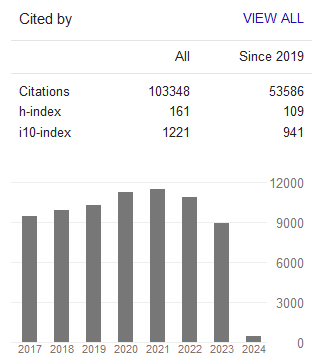Supplementary Livelihood Strategies among Workers in Nigeria: Implications for Organizational Growth and Effectiveness
- USHIE, E. M., AGBA
- AGBA, A. M. OGABOH
- AGBA, M. S.
- BEST, E.G.
Abstract
This paper examines the impact of supplementary livelihood strategies among workers on organizational growth and effectiveness in Nigeria. 320 staff from University of Calabar, Calabar was randomly and purposively selected for the study. Data was gathered through questionnaires. Five hypotheses were postulated and tested using chi-square, independent t-test, z-test and spearsman’s rho correlation. Findings revealed that educational qualification, income and household size influenced workers engagement in supplementary livelihood. The study also revealed that, there is a significant difference between male and female in the engagement on supplementary livelihood. The research further revealed that, workers engagement in supplementary livelihood affects organizational growth and effectiveness. It was recommended among others, that management should pay salaries as at when due and make policies that promote good condition of services.- Full Text:
 PDF
PDF
- DOI:10.5539/ijbm.v5n3p146
Journal Metrics
Google-based Impact Factor (2023): 0.86
h-index(2023): 152
i10-index(2023): 1168

Index
- Academic Journals Database
- AIDEA list (Italian Academy of Business Administration)
- ANVUR (Italian National Agency for the Evaluation of Universities and Research Institutes)
- Berkeley Library
- CNKI Scholar
- COPAC
- EBSCOhost
- Electronic Journals Library
- Elektronische Zeitschriftenbibliothek (EZB)
- EuroPub Database
- Excellence in Research for Australia (ERA)
- Genamics JournalSeek
- GETIT@YALE (Yale University Library)
- IBZ Online
- JournalTOCs
- Library and Archives Canada
- LOCKSS
- MIAR
- National Library of Australia
- Norwegian Centre for Research Data (NSD)
- PKP Open Archives Harvester
- Publons
- Qualis/CAPES
- RePEc
- ROAD
- Scilit
- SHERPA/RoMEO
- Standard Periodical Directory
- Universe Digital Library
- UoS Library
- WorldCat
- ZBW-German National Library of Economics
Contact
- Stephen LeeEditorial Assistant
- ijbm@ccsenet.org
